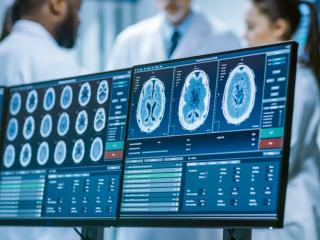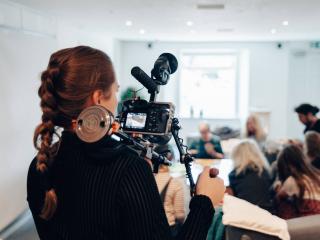Brain and behavior, curiosity in language learning and regulation AI
On Thursday, April 22, 2021, the third edition of the TAISIG Talks took place. TAISIG is the Tilburg University Artificial Intelligence Special Interest Group: a research community committed to Artificial Intelligence (AI). Wouter De Baene, Lieke Gelderloos and Ronald Leenes shared their insights.
Focus on the individual patient
Wouter De Baene presented his research in the domain of cognitive neuroscience and its clinical applications. Classical studies in this domain show that specific regions of the brain are responsible for performance concerning, for example, cognitive flexibility or working memory. However, none of the regions work in isolation as they are both structurally and functionally connected to one another. Damage in a specific area may thus have a broader impact on patients’ cognitive performance post-surgery. Wouter presented two cases in which machine learning methods were applied to draw individual level inferences, replacing traditional group level analyses. His project thus aims to (better) predict the functional outcome for tumor patients after surgery. One interesting practical aspect of his research concerns questions regarding health data privacy and how AI analyses can be conducted on sensitive data safely.
Children can influence their own learning trajectory
Lieke Gelderloos gave the second talk, on active word learning through self-supervision. Studying which words are mapped to which objects in the environment is one of the important goals of computational cognitive science. There are many methods and models to use in this field, but all of them are based on the idea that the learner happens upon language and input. However, research has shown that parents try to follow their children’s attention when teaching them new words, implying that children have potential to shape their own learning trajectory. Can AI learn from this insight? In her work, Lieke has formalized the aspect of curiosity and investigated if it can accelerate computational word learning. In the video accompanying this TAISIG Talks edition, she shares the model and the main results of the research.
AI can continue to grow limitlessly until the law intervenes
Finally, Ronald Leenes discussed the need for AI regulation by law. It is well-known that AI applications have both benefits and drawbacks. Standard examples involve the use of facial recognition, which can help to keep us safe in public places, yet takes away our anonymity. Autonomous vehicles take over the driving tasks, thereby providing comfort for the driver. On the downside, they may not react appropriately in unique hazardous situations. (Killer)drones may take over the role of soldiers, but manning them from a distance will desensitize us to violence and acts of war. In the past years, ethical frameworks have been created to regulate AI but it appears that the regulation needs to be enforced by law. On April 13, 2021, a draft of EU AI Regulation was leaked that constitutes the first attempt in regulating AI. During his talk, Ronald gave his first impression of the regulations and discussed the timeline required for their implementation.



